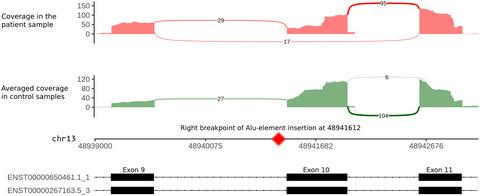当前位置:
X-MOL 学术
›
Mol. Genet. Genomic Med.
›
论文详情
Our official English website, www.x-mol.net, welcomes your
feedback! (Note: you will need to create a separate account there.)
Detection of mobile elements insertions for routine clinical diagnostics in targeted sequencing data
Molecular Genetics & Genomic Medicine ( IF 1.5 ) Pub Date : 2021-09-07 , DOI: 10.1002/mgg3.1807 German Demidov 1 , Joohyun Park 1 , Sorin Armeanu-Ebinger 1 , Cristiana Roggia 1 , Ulrike Faust 1 , Isabell Cordts 2 , Maria Blandfort 3 , Tobias B Haack 1, 4 , Christopher Schroeder 1 , Stephan Ossowski 1
Molecular Genetics & Genomic Medicine ( IF 1.5 ) Pub Date : 2021-09-07 , DOI: 10.1002/mgg3.1807 German Demidov 1 , Joohyun Park 1 , Sorin Armeanu-Ebinger 1 , Cristiana Roggia 1 , Ulrike Faust 1 , Isabell Cordts 2 , Maria Blandfort 3 , Tobias B Haack 1, 4 , Christopher Schroeder 1 , Stephan Ossowski 1
Affiliation

|
Targeted sequencing approaches such as gene panel or exome sequencing have become standard of care for the diagnosis of rare and common genetic disease. The detection and interpretation of point mutations, small insertions and deletions, and even exon-level copy number variants are well established in clinical genetic testing. Other types of genetic variation such as mobile elements insertions (MEIs) are technically difficult to detect. In addition, their downstream clinical interpretation is more complex compared to point mutations due to a larger genomic footprint that can not only predict a clear loss of protein function but might disturb gene regulation and splicing even when located within the non-coding regions. As a consequence, the contribution of MEIs to disease and tumor development remains largely unexplored in routine diagnostics.
中文翻译:

在靶向测序数据中检测用于常规临床诊断的移动元素插入
基因组或外显子组测序等靶向测序方法已成为罕见和常见遗传病诊断的标准护理。点突变、小插入和缺失,甚至外显子水平拷贝数变异的检测和解释在临床基因检测中得到了很好的证实。其他类型的遗传变异,如移动元件插入 (MEI),在技术上难以检测。此外,与点突变相比,它们的下游临床解释更复杂,因为更大的基因组足迹不仅可以预测蛋白质功能的明显丧失,而且即使位于非编码区域内也可能干扰基因调控和剪接。因此,在常规诊断中,MEI 对疾病和肿瘤发展的贡献在很大程度上仍未得到探索。
更新日期:2021-09-07
中文翻译:

在靶向测序数据中检测用于常规临床诊断的移动元素插入
基因组或外显子组测序等靶向测序方法已成为罕见和常见遗传病诊断的标准护理。点突变、小插入和缺失,甚至外显子水平拷贝数变异的检测和解释在临床基因检测中得到了很好的证实。其他类型的遗传变异,如移动元件插入 (MEI),在技术上难以检测。此外,与点突变相比,它们的下游临床解释更复杂,因为更大的基因组足迹不仅可以预测蛋白质功能的明显丧失,而且即使位于非编码区域内也可能干扰基因调控和剪接。因此,在常规诊断中,MEI 对疾病和肿瘤发展的贡献在很大程度上仍未得到探索。









































 京公网安备 11010802027423号
京公网安备 11010802027423号